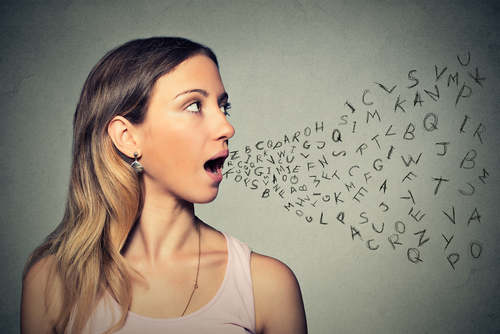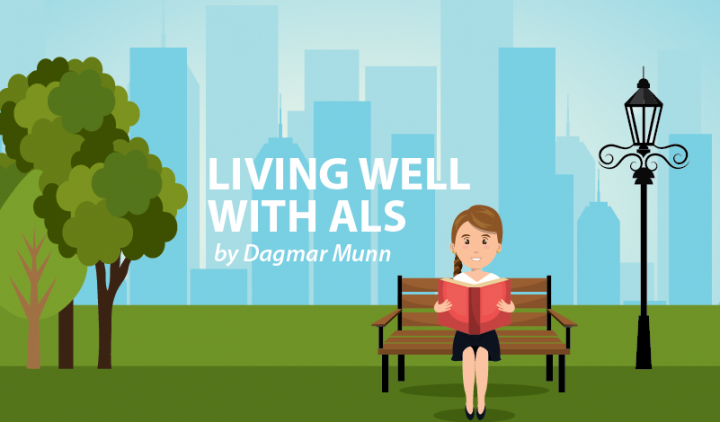Living Loudly and Laughing with Dysarthria
Written by |

About four years ago, ALS impeded my speaking ability. Like more than 80 percent of all ALS patients, I now have dysarthria, or what I refer to as my “ALS voice.” It’s a slurred, slow speech pattern with a nasal tone and imprecise pronunciation of consonants. For example, I use a “bar-rush” for my hair” and ask for “a fawk and a sch-poon” at dinner. To further conserve my ability to speak, I utilize diaphragmatic breathing, which while helpful, causes me to speak in a much lower octave. Understandably, the onset of this latest health challenge has only confirmed my intent to maintain a sense of humor while living with ALS.
Like so many others who live with dysarthria, I’ve learned to compensate by adding in extra body language and facial expressions to help listeners understand what I’m trying to say. Sometimes I feel as if I’m stuck in a foreign-language film with bad captioning; my mouth moves and arms wave, but the caption below simply reads, “Yes.”
Thankfully, I’ve often found that I’m not always the only one treating these dysarthria challenges humorously!
Phoney voices
Talking on the phone puts “ALS-voice” on full display, as I can’t rely on smiles and gestures to help me out. However, most folks who know me and call our house aren’t shocked at all when they hear my gruff “heh-roh.” They kindly carry on the conversation and in no way assume that an angry pirate has suddenly taken up residence in our home.
But I’ll admit to having a little fun with telephone solicitors and political pollsters, because now whenever I answer the phone, they hang up on ME!
A meeting of mimes
We all have a method of communication we default to when stressed or confronted with someone who doesn’t understand us. Years ago, I learned American Sign Language and now, whenever I hit a frustration point while talking, I find myself in default and “signing” the words. The joke’s on me, as no one around me understands sign language! I can only imagine everyone thinks I’m having a case of muscle cramps while trying to make normal gestures.
The tables turn, however, if I happen to meet up with a person who I haven’t seen in a long while. Obviously not familiar with ALS or dysarthria, they greet me by talking very loud and overly enunciating their words. As I watch them, I wonder if they had a granny or Aunt Bessie who was hard of hearing. Did seeing my rollator trigger their method of speaking?
This always puts me in a dilemma. Should I play along and answer in the same loud way? Or risk their embarrassment by stating that my hearing is fine? Thankfully, I don’t have to decide, as most folks quickly tire from the physical effort and say their goodbyes.
I attend a local club where a person insists on not only speaking to me in a loud voice and very slow, but also adds pantomime. It’s quite a show. I finally figured out that she loves to travel overseas and is just using her unique default style. It’s the same speaking pantomime act that works for her when stopping locals in a foreign country and asking directions to the nearest restaurant.
Good intentions
My favorite story about speaking too loudly happened a few years ago when I went to get my annual flu shot at our local grocery store.
They have an in-house pharmacy with a little medical room for added privacy. The day I showed up, about eight of us sat shoulder to shoulder in the small windowless waiting room. The pharmacist administered the shots in an even smaller room. A thin sliding door with mottled glass separated the two areas, so we in the waiting room could clearly hear what was said in the injection room.
A sweet older woman had just been called in and I was next. She must have been nervous because she asked the pharmacist how long he had been giving shots. Through the glass door, we heard him answer.
“Me? Oh, I’ve been giving shots for a long, long time. In fact, I grew up on a farm in Illinois and learned how to give shots on the farm animals.”
Without missing a beat, I turned to the man sitting next to me and said just as loud, “I’ll let you go next.”
The whole room cracked up.
Even though ALS and dysarthria can be challenging, I believe that by facing each day with humor and a positive attitude, we can live well while living with ALS.
***
Note: ALS News Today is strictly a news and information website about the disease. It does not provide medical advice, diagnosis, or treatment. This content is not intended to be a substitute for professional medical advice, diagnosis, or treatment. Always seek the advice of your physician or other qualified health provider with any questions you may have regarding a medical condition. Never disregard professional medical advice or delay in seeking it because of something you have read on this website. The opinions expressed in this column are not those of ALS News Today or its parent company, Bionews Services, and are intended to spark discussion about issues pertaining to ALS.







David Buschhorn
I'm a humor writer and of course, I use humor in my ALS stories on social media. I get a lot of statements like, "You're the bravest person I know."
I have to correct them.
"Oh don't get me wrong, it sucks. I just see the humor in so many situations. If you read the side effects of a medication, there's almost always something in there that'll crack people up."
In my books, the characters are faced with the worst catastrophe in modern history. Even the children are making "inappropriate" jokes, which leave you laughing and then wondering, "What kind of person am I? That should NOT have been funny!"
Yet there you are... laughing your horrible head off. YOU can always make jokes about your situation. They're only funny if you do it. Your doctor can't joke about your abbreviated lifespan or your jacked up left hand, but you sure can! And you know what? There's so much tension around the handicapped that their disability aches for some release. A joke that normally wouldn't be that funny is now HILARIOUS just for the sake of the anxiety in the room :-)
Dagmar Munn
Thank you David - - yes, we need more humor...and I'm glad to know you're helping to fill that need. Keep on laughing my friend! :-)